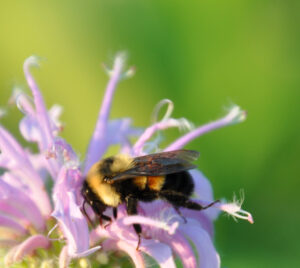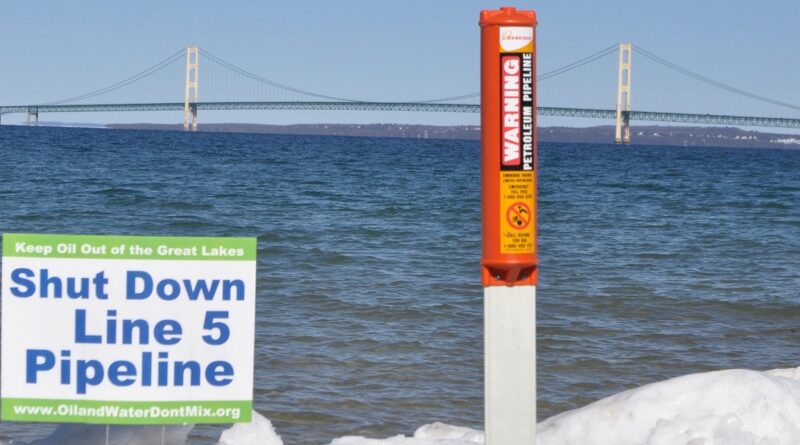High Noon in the Straits of Mackinac
Podcast: Play in new window | Download (Duration: 1:35:04 — 43.2MB)
Subscribe: Apple Podcasts | Spotify | Android | iHeartRadio | Podchaser | Email | TuneIn | RSS | More
(June 28, 2020) There’s one thing that all oil pipelines do. They leak. And if a 67-year-old oil pipeline that sits on the bottom of Lake Michigan decides to leak, it could irreparably damage the greatest source of fresh water in the world. The pipeline currently transports 540,000 barrels of light crude oil and natural gas liquids per day, or about 22.6 million gallons per day. That’s why it’s high noon in the Straits of Mackinac.
Skip to a specific segment in this podcast.
14:32 Mary Phillips, Jill Utrup
47:41 Liz Kirkwood, Mitch McNeil
1:26:20 Meteorologist Rick DiMaio
Enbridge Line 5 is controversial for a number reasons. Actually, we’re talking about two pipelines that run parallel to each other through the straits. The first issue, as noted above, is the age of the pipes. A group called Oil & Water Don’t Mix lists many more–including the safety record of Enbridge, Inc., the Canadian company that operates the pipeline. Oil & Water has more to say about the “problem” here.
For instance, in 2010, the company’s 6B pipeline near Marshall, Michigan spilled at least 1.15 million gallons of oil into the Kalamazoo River. How do we know? That’s the estimate from Enbridge itself. So you can assume that the spill was significantly larger. It was, in fact “the largest and most costly inland oil spill in U.S. history, saturating around 40 miles of the Kalamazoo River watershed.”
If you happen to like the Greats Lakes and fresh water and you’re not alarmed yet, here’s more. Another group, called For Love of Water (FLOW), lists even more concerns about Line 5.
- University of Michigan studies call the Mackinac Straits the “worst possible place” for a Great Lakes oil spill, which could pollute up to 720 miles of shoreline along Lake Michigan and Lake Huron.
- Enbridge’s data reveal that sections of Line 5 in the Mackinac Straits are cracked and dented, and a segment on land near the Straits has lost 26% of its original wall thickness.
- Under the best conditions, only 30% of an oil spill would be recovered.
- 1.5 million jobs are directly tied in some way to the Great Lakes, generating more than $62 billion in wages.
Meanwhile, at high noon, Enbridge says that it can stop transporting oil through through those parallel pipes by 2024! Unfortunately, to do that, they will have to build a $180 billion tunnel in the bedrock under the straits. Which means that the usual construction damage to the environment during the four or five year process will occur. And it will encourage Enbridge to pump even more dangerous tar sands oil through the pipeline. There are all kinds of alternatives to that plan, which you can read about here.
But wait. There’s more!
Elections have consequences. And, in 2018, Michigan voters showed Republican Governor Rick Snyder and his attorney general the door. They were replaced by Democratic Governor Gretchen Whitmer and Attorney General Dana Nessel. Nessel, in particular, campaigned on shutting down Line 5. She and the energy company have been battling it out in the courts since she was elected. One of the latest decisions from the Michigan courts was on June 11. The Michigan Court of Appeals ruled that the deal struck by Enbridge and out-going Governor Snyder (can you spell “lame duck session”?) was valid. Meaning that the company could go ahead with its plans to build the tunnel…at least until the attorney general appealed it to the Michigan Supreme Court.
But wait. There’s even MORE!
Just a week ago, Enbridge reported to the state that it found “significant damage” to an anchor support on one of the twin pipelines. Wha??? The damage was apparently to the east pipeline. After shutting down both pipelines for about 24 hours, the company unilaterally decided that everything was okey-dokey and they re-opened the west line without seeking permission from the State of Michigan.
That had Nessel running back to Ingham County Circuit Court Judge James S. Jamo to seek a temporary restraining order to shut down both of the pipelines. On Thursday, June 25, Jamo agreed. In a news release, Nessel had this to say.
“While the fact that Enbridge reactivated one of the lines before consulting with the State is concerning, the fact that the company has failed to disclose the cause of this damage is equally alarming, considering the impact a breach in the pipeline could have to our state residents and economy. With the continued operation of this pipeline, the risk of severe and lasting environmental damage to Michigan’s most important natural resource continues to grow every day. However, this ruling, while significant, is only a short-term fix. If the lines are put back into operation, one mismanaged incident or accident would result in a historic catastrophe for our state. Work must continue toward complete removal of Line 5 from our waters.”
In granting the temporary restraining order, the Court noted that the 1953 Easement Agreement between the State of Michigan and Enbridge required Enbridge to exercise due care and operate the pipelines as a reasonably prudent person would.
I added the bold type to make a point. When’s the last time that an oil company acted as a reasonably prudent person would? Like I keep saying, it’s high noon in the Straits of Mackinac.
Today, we welcome Liz Kirkwood, J.D., Executive Director of FLOW (For Love Of Water), back to our show. She was last with us almost exactly three years ago, in June of 2017. A lot has changed since then, but Enbridge Line 5 is still a threat to the Great Lakes. Depending on Internet connections, she will be joined by Mitch McNeil, a friend of the show and Chair of the Chicago Chapter of the Surfrider Foundation.
High noon for pollinators
Just last week, we talked to the wonderful May Berenbaum, Ph.D. from the Department of Entomology at the University of Illinois at Urbana-Champaign. She made us aware that, while it might not be called an “insect apocalypse,” our six-legged friends are in trouble.
This week, we look for solutions. So, we’re happy to welcome Mary Phillips back to our show. She works for the National Wildlife Federation. as the Senior Director of Conservation Education for the Garden for Wildlife program. She joined us last year to talk about the National Pollinator Garden Network and their Million Pollinator Garden Challenge which crashed through that goal more than a year ago.
BTW, Garden for Wildlife is the nation’s longest running backyard habitat gardening program. Just sayin’. Phillips says that a recent NWF survey discovered that
- Over the last three years, 64.1 million or one in four American adults purchased a plant because it was beneficial to birds, bees or butterflies. People who identified as Latino or Hispanic represented the highest numbers purchasing wildlife beneficial plants.
- 36.8 million (one in seven) or 14 percent of American adults purchased plants native to where they live in 2019.
- 23.1 million or 9 percent of American adults converted part of their lawn to natural/wildflower landscape in 2019.
She also reports that after 47 years, GFW is about to reach their 250,000th Certified Wildlife Habitat. Not shabby. The COVID-19 pandemic has also seemed to make an impact on gardening with nature in mind. Since January, Phillips says that close to 12,000 Certified Wildlife Habitats® have been registered. March, April, and May saw double the amount of people creating habitat vs last year same time.
But wait. There’s more! (Seems to be a theme today.) More than 60,000 people pledged to become Butterfly Heroes in May and plant for pollinators. In addition, Dr. Doug Tallamy (who has been on this program many times) has been their partner with the Native Plant Finder. That site has received close to a half million visitors since it was launched 4 years ago.

Mary Phillips is joined today by Fish and Wildlife Biologist Jill Utrup from Region 3 of the U.S. Fish and Wildlife Service in Bloomington, Minnesota. She wants us to know about an upcoming citizen science opportunity that will be occurring July 24-August 2. It’s called Backyard Bumble Bee Count and you can make a difference by participating! Here’s the iNaturalist site about the same event.
Utrup notes that Also, her office leads the effort in recovery of the endangered rusty patch bumble bee, which can still be found in the Chicago area. I was a bit surprised to learn that. Citizen/community science efforts like the one above can help us learn more about the species’ population health.
I don’t know about you, but bumble bees are always welcome in my yard. To me, they’re a sign that all is right with the world, even though we know that all is NOT right with the world. The point is that we need to do what we can. So please, keep trying.
High noon at the 60-Second Garden Video Challenge
 COVID-19 has not been kind to a lot of groups and institutions, including our very own Chicago Excellence in Gardening Awards. The timing of the crisis has made it impossible for CEGA to go out and judge Chicago’s gardens in person. However, because people have been stuck at home, they’re apparently gardening more than ever. So CEGA has decided to do an “end around” the pandemic by creating the 60-Second Garden Video Challenge. It’s a chance for you to strut your stuff and show us your garden…but you have only one minute!
COVID-19 has not been kind to a lot of groups and institutions, including our very own Chicago Excellence in Gardening Awards. The timing of the crisis has made it impossible for CEGA to go out and judge Chicago’s gardens in person. However, because people have been stuck at home, they’re apparently gardening more than ever. So CEGA has decided to do an “end around” the pandemic by creating the 60-Second Garden Video Challenge. It’s a chance for you to strut your stuff and show us your garden…but you have only one minute!
Go to Chicago Excellence in Gardening Awards. to see the details. But, basically, you make a one-minute video of your garden. You can walk around with your camera and talk about what’s happening. Or you can put together a video slide show of still photographs, with narration or not. Or you can do a combination. Your video can be straightforward, clever, artistic, funny, whatever you like. But it has to be no longer than 60 seconds.
Then, you upload it to the CEGA website (there’s a link). Then we upload it to our YouTube page, where folks can give it a thumbs up. The videos with the most “votes” will be declared the winners, and we’ll have some nifty prizes to give out.
So grab your camera and head out to your garden today!


